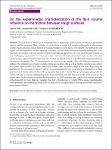Item Infomation
Full metadata record
| DC Field | Value | Language |
|---|---|---|
| dc.contributor.author | Lukas, Stahl | - |
| dc.contributor.author | Michael, Müller | - |
| dc.contributor.author | Georg-Peter, Ostermeyer | - |
| dc.date.accessioned | 2023-04-14T06:54:06Z | - |
| dc.date.available | 2023-04-14T06:54:06Z | - |
| dc.date.issued | 2022 | - |
| dc.identifier.uri | https://link.springer.com/article/10.1007/s40544-022-0683-9 | - |
| dc.identifier.uri | https://dlib.phenikaa-uni.edu.vn/handle/PNK/7940 | - |
| dc.description | CC BY | vi |
| dc.description.abstract | The load-bearing behaviour of lubricated contacts depends primarily on the normal force, the relative velocity, and the geometry. Thus, with the aid of the Stribeck curve, it is usually well possible to characterize whether hydrodynamics, mixed friction, or boundary friction is more likely to be present. The fact that the load regime can also depend on the fluid quantity is obvious, but has hardly been systematically investigated so far. Especially for contacts with microscopic roughness, the defined application of a very small amount of fluid is a very challenging requirement. In this paper, a very fundamental study shows how a pin-on-disc tribometer can be used to achieve the transition from dry friction via mixed friction to predominant hydrodynamics by the amount of supplied fluid. | vi |
| dc.language.iso | en | vi |
| dc.publisher | Springer | vi |
| dc.subject | load-bearing behaviour | vi |
| dc.subject | mixed friction | vi |
| dc.title | On the experimental characterization of the fluid volume influence on the friction between rough surfaces | vi |
| dc.type | Book | vi |
| Appears in Collections | ||
| OER - Kỹ thuật điện; Điện tử - Viễn thông | ||
Files in This Item:

